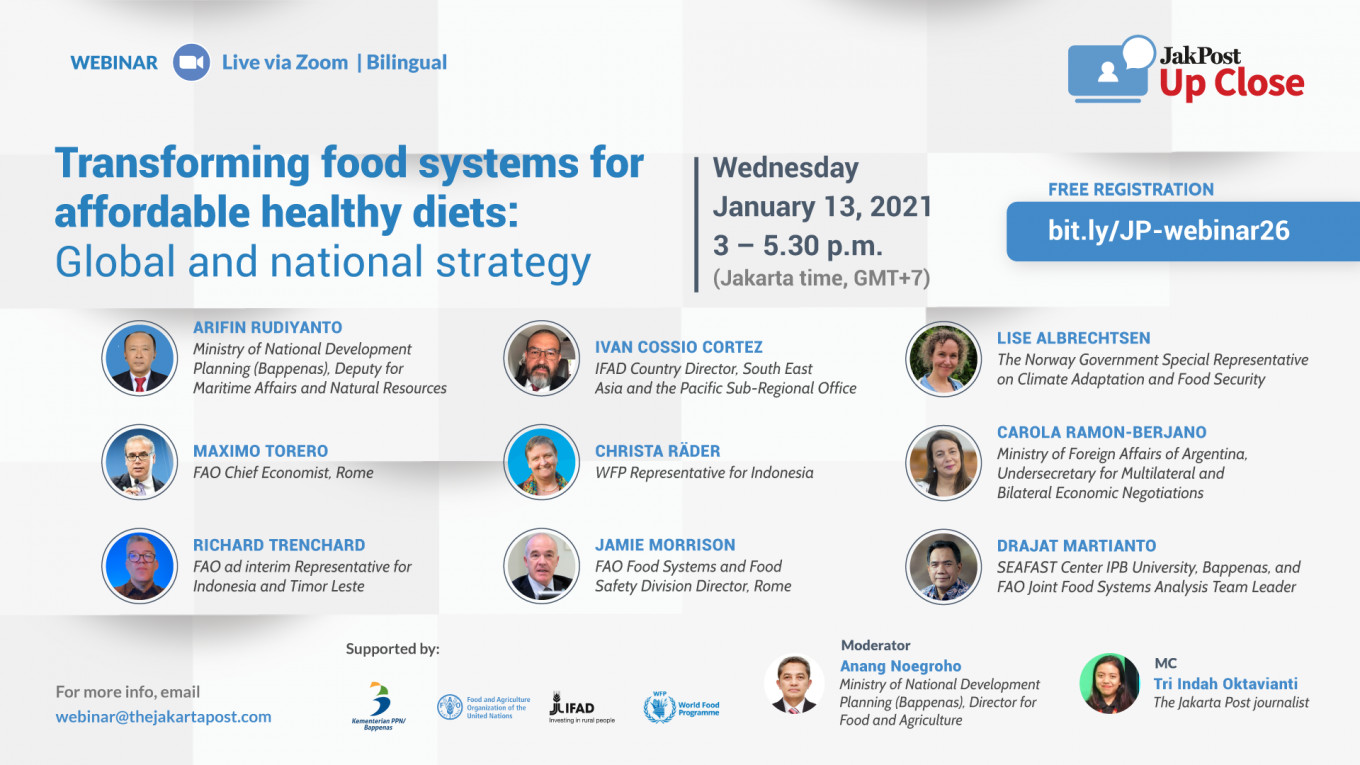Popular Reads
Top Results
Can't find what you're looking for?
View all search resultsPopular Reads
Top Results
Can't find what you're looking for?
View all search resultsTransforming food systems for affordable healthy diets: Global and national strategy
It has been acknowledged that the food systems in Indonesia are not delivering as expected and some form of transformative change is required.
Change text size
Gift Premium Articles
to Anyone
I
t has been acknowledged that the food systems in Indonesia are not delivering as expected and some form of transformative change is required. Indonesia’s food systems still see inadequate quality of food intake and dietary diversity is not affordable for many, especially the poor.
The Global Food Security Index 2019 ranks Indonesia in 12th place out of 23 countries in Asia and the Pacific. But, although there was an improvement in the overall score of the food security index from 62.0 in 2018 to 62.6 in 2019, Indonesia still faces considerable challenges to achieve food security, in which people have access to healthy and diverse diets.
The challenges are evident, as shown by the Health Ministry’s 2018 Basic Health Survey (Riskesdas) in which 27.7 percent of Indonesian children under the age of 5 years had experienced stunting, 35.4 percent of Indonesian adults were either overweight or obese and 48.9 percent of pregnant women had anemia.
Therefore, the significant transformation of existing food systems is required to reduce the cost of food, ensuring the affordability of healthy diets for all people. Meanwhile, preserving the environment and improving the livelihoods of small-scale farmers and other food supply chain actors must also be done together with the transformation.
Not to mention that in the face of shocks during the COVID-19 pandemic, intervention is needed to strengthen the resilience of food systems.
The Jakarta Post webinar JakPost Up Close on transforming food systems for affordable healthy diets: Global and national strategy
The Jakarta Post webinar series, jointly organized by Bappenas, FAO, IFAD and WFP, the latter three of which are based in Rome, will be convened as a kick-off event, prior to the Sustainable Food Systems Forum and Dialogues for the preparation on the upcoming UN Food Systems Summit 2021.
Aside from in Indonesia, food systems transformation is also required in many other parts of the world.
A report published by FAO, IFAD, UNICEF, WFP and WHO in 2020, The State of Food Security and Nutrition in the World 2020: Transforming food systems for affordable healthy diets, said globally, estimates of the cost and affordability of diets suggested that more than 3 billion people could afford a healthy diet, more than 1. 5 billion could not afford a diet that met the required levels of essential nutrients and 185 million did not have access to diet with sufficient dietary energy.
Titled “Transforming food systems for affordable healthy diets: Global and national strategy”, the webinar is to highlight:
- Global and national strategy on food systems transformation, including inter-agencies’ coordination to advance the transformation process. The transformation is expected to shift the production and supply side of agriculture sectoral approach to the holistic sustainable food systems approach. This shift is expected to achieve affordable healthy diets in Indonesia.
- Methodological framework in support of food systems transformation that will serve as the operational strategy for the road map toward ensuring the affordability of healthy diets.
- Experiences in food systems transformation in Indonesia, Norway and Argentina.
- Possible policy options and investments that will foster food systems transformation to make healthy diets affordable and accessible for all.
The webinar will be held in English via Zoom from 3 to 5.30 p.m. on Wednesday, Jan. 13, 2021 and will feature:
- Arifin Rudiyanto, National Development Planning Ministry (Bappenas), Deputy for Maritime Affairs and Natural Resources
- Maximo Torero, FAO Chief Economist, Rome
- Richard Trenchard, FAO ad interim Representative for Indonesia and Timor Leste
- Ivan Cossio Cortez, IFAD Country Director, Southeast Asia and the Pacific Sub-Regional Office
- Christa Räder, WFP Representative for Indonesia
- Jamie Morrison, FAO Food systems and Food Safety Division Director, Rome
- Lise Albrechtsen, Norway Special Representative on Climate Adaptation and Food Security
- Carola Ramon-Berjano, Ministry of Foreign Affairs of Argentina, Undersecretary for Multilateral and Bilateral Economic Negotiations
- Drajat Martianto, SEAFAST Center IPB University, Bappenas and FAO Joint Food System Analysis Team Leader
Arifin Rudiyanto, who will open the webinar, will highlight the government’s leadership and perspectives.
Maximo Torero, who will also deliver a keynote address, will discuss several topics, including the multidimensional challenges of food systems transformation, the role that science can play and the opportunities created for innovation in food systems governance.
Christa Räder, who will deliver a keynote address, will speak on the objectives and roles of the international webinar.
Jamie Morrison will share his views on the principal meanings of the Food Systems Summit (FSS) Dialogue in the Food Systems transformation process globally and nationally.
We can also learn from other countries around the word in establishing a sustainable food systems. Lise Albrechtsen and Carola Ramon-Berjano will share their views on how their respective countries have applied a broad multisectoral transformative food system approach by showcasing the government’s action plan on sustainable food systems.
Drajat Martianto will speak about the national food system transformation process of Indonesia, with its policies and governance as a baseline.
The webinar aims to facilitate discourse between a range of stakeholder organizations, including Bappenas, the Agriculture Ministry, Maritime Affairs and Fisheries Ministry, Health Ministry, Trade Ministry, State-Owned Enterprises Ministry (specifically on food clusters), Food and Drug Control Agency, NGOs, CSOs and other FAO member states, as well as private sector employees, university students and those interested in seeking information on food systems transformation in Indonesia. Free registration: https://bit.ly/JP-webinar26.










